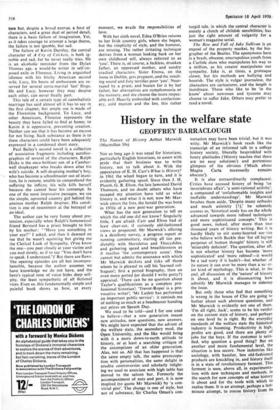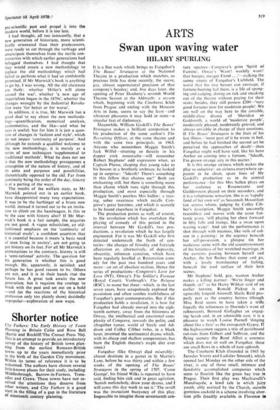History in the welfare state
GEOFFREY BARRACLOUGH
The Nature of History Arthur Marwick (Macmillan 50s) Not so long ago it was usual for historians, particularly English historians, to assert with pride that their business was to write history, not to talk about it. With the appearance of E. H. Carr's What is History? in 1961 the wheel began to turn, and it is evidently gathering speed. Since then J. H. Plumb, G. R. Elton, the late lamented David Thomson, and no doubt others who have escaped my attention have told us what history is, and what it is not; now Mr Mar- wick enters the lists, the herald (he was born in 1936) of a new post-war generation.
What has the new generation to tell us which the old one did not know? Singularly little, I am afraid. Carr and Elton had at least clear-cut, if curiously old-fashioned views to propound. Mr Manvick's offering is a desultory survey, a progress report or running commentary, starting all too pre- dictably with Herodotus and Thucydides, and gathering speed and breathlessness as it reaches 'the contemporary scene'. One cannot but admire the assurance with which Mr Marwick dockets and ticks off those whom he is pleased to call his 'learned col- leagues'; first a potted biography, then an even more potted (or should I write potty?) appraisal. 'There can be no question about Taylor's qualifications as a complete pro- fe,ssional historian'; Trevor-Roper is a pro- vocative writer'; 'Mr Laslett has performed an important public service': it reminds me of nothing so much as a headmaster handing out prizes on Speech Day.
We used to be told—and I for one used to believe—that a new generation meant new attitudes, new questions, new answers. We might have expected that the-advent of the welfare state, the secondary mod, the Open University, and the like would bring with it a more down-to-earth attitude to history, or at least a searching critique of the assumptions of an older generation. Alas, not so. All that has happened is that the same empty talk, the same preoccupa- tion with personalities, the same delight in erudite controversies and scholarly infight- ing we used to associate with high table has moved to the saloon bar. Formerly the accompaniment of nuts and port, it is now inspired (to quote Mr Marwick) by 'a con- vivial pint'. The change is one of style, but not of substance. Sir Charles Oman's con-
versation may have been trivial, but it was witty. Mr Marwick's book reads like the transcript of an informal talk to a college history society, liberally besprinkled with hoary platitudes ('History teaches that there are no easy solutions') and portentous glimpses of the obvious ('Much about Magna Carta necessarily remains obscure').
It is also extraordinarily complacent. Critics have accused history of being 'an invertebrate affair', 'a semi-rational activity', a compound of 'unfathomable insights and ineffable understandings'. Mr Marwick brushes them aside. 'Despite many setbacks and much asininity [!],' he solemnly assures us, 'historical study has on the whole advanced towards more refined techniques and more sophisticated concepts.' This is good news, indeed, after more than two thousand years of history writing. But it is hardly likely to stir stony-hearted sce-tics who believe with Buckle that 'for all higher purposes of human thought' history is still 'miserably deficient'. The question, after all, is not whether history has become 'more sophisticated' and 'more refined'—it would be a sad story if it hadn't—but whether of its nature it can ever be more than a stv er- ior kind of mythology. This is what, in the end, all discussion of the 'nature' of history is about, and it is disconcerting how adroitly Mr Marwick manages to sidestep the issue.
But only those who feel that something is wrong in the house of Clio are going to bother about such abstruse questions, and Mr Marwick is evidently not one of them. 'I'm all right, Jack', seems to be his verdict on the current state of history, and perhaps on one level he is right. By the everyday standards of the welfare state the historical industry is booming. Productivity is high, profits are good, and there are plenty of jobs for the boys. If the customer is satis- fied, why question a good thing? But on another and more fundamental level, the situation is less secure. New industries like sociology, with handier, less old-fashioned products are knuckling in, and history itself is in a state of revolutionary ferment. This ferment is seen, above all, in experimenta- tion with new techniques and methods, in the search for new concepts of what history is about and for the tools with which to realise them. It is an attempt, perhaps a last- minute attempt, to rescue history from its pre-scientific past and propel it into the• modern world, before it is too late.
I had thought, all too innocently, that a new generation of historians, more scienti- fically orientated than their predecessors, were ready to cut through the verbiage and emancipate themselves from the sterile con- troversies with which earlier generations had befogged themselves. I had thought that they would create a new methodology to replace the old methodology which had failed to perform what it had so confidently promised. If Mr Marwick's book is anything to go by, I was wrong. All the old chestnuts are there: whether 'Hitler's will alone caused the war', whether 'a new age of imperialism began in the 1870s', whether the changes wrought by the Industrial Revolu- tion were 'for better or for worse'.
In addition, it is true, Mr Marwick has a good deal to say about the new methodo- logy—quantification, numerical analysis, econometrics, and the like—and what he says is useful; but for him it is just a ques- tion of changes in 'fashion and style', which do not impair 'continuity of purpose'. And although he extends a qualified welcome to the new methodology, it is merely as a series of new techniques 'supplemental to traditional methods'. What he does not see is that the new methodology presupposes a conception of the nature of history, and of its aims and purposes and possibilities, diametrically opposed to the old. Far from continuity being the order of the day, history is at a parting of the ways.
The results of the welfare state, as Mr Marwick pointed out in an earlier book, have disappointed many rosy expectations. It was to be the harbinger of a brave new world; instead it turned out to be an invita- tion to climb on the bandwagon. Is this to be the case with history also? If Mr Mar- wick's book is a fair sample, the auguries are not good. A vague eclecticism, an old- fashioned emphasis on the 'continuity of historical study', a confident assertion that it is essential because it meets 'a basic need of men living in society', are not going to put history on its feet. For all Mr Marwick's protestations to the contrary, history is still a `semi-rational' activity. The question for his generation is whether this is good enough. He, apparently, is satisfied; and perhaps he has good reason to be. Others are not, and it is in their hands that the future lies. A great task awaits the new generation; but it requires the courage to break with the past and set out on a bold —and (as the reactions of the historical profession only too plainly show) decidedly unpopular—exploration of new ways.







































 Previous page
Previous page